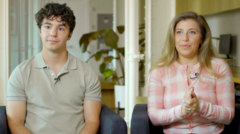Legendary musicians Elton John and Dua Lipa are among over 400 signatories urging UK Prime Minister to strengthen copyright protections against AI misuse.
Titans of Music Unite Against AI Threat

Titans of Music Unite Against AI Threat
Prominent Artists Call for Updated Copyright Laws to Safeguard Their Work from AI Exploitation
In a significant move echoing deep concerns in the creative community, over 400 prominent British artists, including Elton John, Dua Lipa, Ian McKellen, and Florence Welch, have rallied for urgent reform of copyright laws to shield their intellectual property from encroachment by artificial intelligence (AI) technologies.
In an open letter addressed to Sir Keir Starmer, the artists emphasized that without robust legal protections, they would be "giving away" their creative works to technology corporations, compromising the UK's esteemed status as a hub of creativity.
The star-studded signatory list also features distinguished figures such as author Kazuo Ishiguro, playwright David Hare, singers Kate Bush and Robbie Williams, alongside renowned bands like Coldplay and iconic filmmakers including Richard Curtis. Sir Paul McCartney’s signature signifies a collective concern that AI could exploit their artistic contributions without appropriate compensation or acknowledgment.
"We are wealth creators, and we shape the cultural narrative of the nation. It's imperative that AI recognizes its dependence on human creativity just as it relies on technology and computing expertise," the letter states. The artists are advocating for an amendment to the Data (Use and Access) Bill that would compel AI developers to disclose their use of copyrighted material when training their models.
Government officials responded, asserting that they strive for the prosperity of both creative industries and tech sectors, and are consulting on a suite of measures that they hope will benefit both domains. A spokesperson underlined their commitment to ensure that proposed changes would be satisfactory for creators.
However, the artists' stance has faced skepticism. Julia Willemyns, co-founder of the Centre for British Progress think tank, cautioned that the suggested measures could hinder growth in the UK. She argued that strict copyright regulations might push AI development offshore, adversely impacting domestic innovation and the economy.
As the outsized capabilities of generative AI systems become more integrated into consumer life, apprehension rises among artists over the potential misuse of their copyrighted works in creating AI-generated content, which can mimic human creativity.
In light of backlash against earlier proposals, the government has reconsidered plans, and Baroness Kidron's amendment—which aims to foster transparent licensing agreements between AI developers and artists—may provide a pathway to balance creator rights and technology advancement.
Baroness Kidron highlighted the UK’s opportunity to become a global leader in the AI sector, positing that her proposed amendments would catalyze a dynamic licensing market necessary for both creators and developers to thrive.
While a recent attempt by Kidron to hold AI developers accountable to UK copyright law was declined, the call for transparency seems increasingly crucial as the country navigates the complexities of AI integration in creative industries.
The government has committed to conducting a comprehensive review and economic assessment of the prevailing issues surrounding copyright and AI, aiming for an inclusive approach moving forward.
As the debate intensifies, the creative community continues to advocate for their rights, stressing that a balanced framework is essential for ensuring the sustainability of both artistic creation and technological innovation.
In an open letter addressed to Sir Keir Starmer, the artists emphasized that without robust legal protections, they would be "giving away" their creative works to technology corporations, compromising the UK's esteemed status as a hub of creativity.
The star-studded signatory list also features distinguished figures such as author Kazuo Ishiguro, playwright David Hare, singers Kate Bush and Robbie Williams, alongside renowned bands like Coldplay and iconic filmmakers including Richard Curtis. Sir Paul McCartney’s signature signifies a collective concern that AI could exploit their artistic contributions without appropriate compensation or acknowledgment.
"We are wealth creators, and we shape the cultural narrative of the nation. It's imperative that AI recognizes its dependence on human creativity just as it relies on technology and computing expertise," the letter states. The artists are advocating for an amendment to the Data (Use and Access) Bill that would compel AI developers to disclose their use of copyrighted material when training their models.
Government officials responded, asserting that they strive for the prosperity of both creative industries and tech sectors, and are consulting on a suite of measures that they hope will benefit both domains. A spokesperson underlined their commitment to ensure that proposed changes would be satisfactory for creators.
However, the artists' stance has faced skepticism. Julia Willemyns, co-founder of the Centre for British Progress think tank, cautioned that the suggested measures could hinder growth in the UK. She argued that strict copyright regulations might push AI development offshore, adversely impacting domestic innovation and the economy.
As the outsized capabilities of generative AI systems become more integrated into consumer life, apprehension rises among artists over the potential misuse of their copyrighted works in creating AI-generated content, which can mimic human creativity.
In light of backlash against earlier proposals, the government has reconsidered plans, and Baroness Kidron's amendment—which aims to foster transparent licensing agreements between AI developers and artists—may provide a pathway to balance creator rights and technology advancement.
Baroness Kidron highlighted the UK’s opportunity to become a global leader in the AI sector, positing that her proposed amendments would catalyze a dynamic licensing market necessary for both creators and developers to thrive.
While a recent attempt by Kidron to hold AI developers accountable to UK copyright law was declined, the call for transparency seems increasingly crucial as the country navigates the complexities of AI integration in creative industries.
The government has committed to conducting a comprehensive review and economic assessment of the prevailing issues surrounding copyright and AI, aiming for an inclusive approach moving forward.
As the debate intensifies, the creative community continues to advocate for their rights, stressing that a balanced framework is essential for ensuring the sustainability of both artistic creation and technological innovation.




















